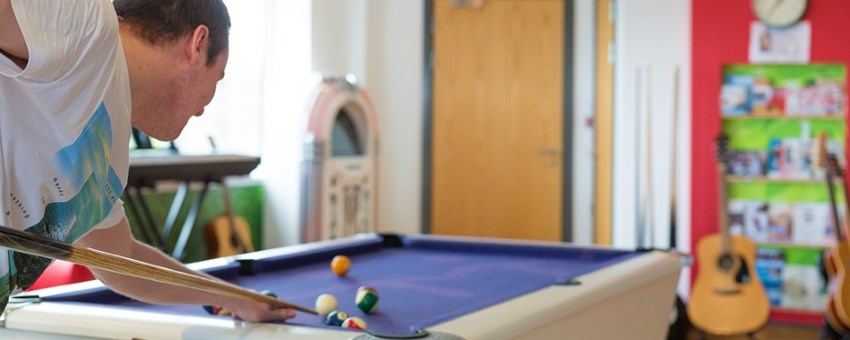Teenage and Young Adult Cancer Service
The Teenage and Young Adult Cancer Team provides practical and emotional support to young people aged 16-26 years with cancer and their families at all stages of their care. This support reaches across West Regional Scotland, regardless of where the young person is being treated.
The Unit
The unit provides care in a relaxed, colourful and vibrant environment. There are 8 beds in the unit and a day room (the chillout zone).
The Chill Out area is a social space for young people, both in-patients and out-patients. Friends and family are welcome to use the space if they are supporting the young person or have been invited to join in with a specific activity. The space provides a fun and relaxed environment whilst in hospital. It comes fully equipped with a TV, Sky channels, computers, X-box, Playstation, musical instruments, a unit juke box, pool table, arts and crafts materials and a selection of games.
There is also a small kitchen which includes a kettle, toaster, fridge and microwave. Young people are actively encouraged to utilise the space.
The Team
Young Lives v`s Cancer Social Worker can provide emotional, practical and financial support to young people who have cancer and their families. They can provide information, advocate and liaise or signpost to other agencies on your behalf.
Young Lives v`s Cancer Social Worker can offer a care grant and have a knowledge of other charities who may be able to offer further grants and UK breaks.
Contact Us
The young person’s social worker is available Monday to Friday 9am-5pm
Emma Brady Tel: 0141 301 7680 or 07970 994 715
Email: emma.brady@younglivesvscancer.org.uk
Bryony Mellars Tel: 0141 301 7680 or 07966 460 256
Email: bryony.mellars@younglivesvscancer.org.uk
Tel: 0141 301 7680 or 07765 048 473
or visit the website: younglivesvscancer.org.uk
Teenagers and young adults have specific needs that are different to those of children or older adults. Most patients within this age group will meet one of the Clinical Nurse Specialists (CNS) for Teenagers and Young Adults with Cancer. They work across many teams and will help coordinate care.
What Do We Do For Young Patients?
- Act as a named point of contact on a day-to-day basis
- Arrange appropriate support from other professionals
- Provide ongoing information and support at all stages of your care
- Listen to your views
- Give you the opportunity to be involved in your care
- Promote your independence
- Support you in making decisions
- Help you cope with the physical, social and emotional effect of cancer and its treatment
- Communicate with your school/college/university to support you through your education
- Organise teaching programmes for schools/colleges about issues relating to cancer and young people
- Work with community teams to arrange support at home
- Visit you at home, hospital or in a place of your choice
- We will also offer advice on work, finances and other aspects of your life that can be affected by cancer.
What do we do for families?
- Provide information and support throughout treatment and beyond
- Identify and arrange other sources of support
- Explore ways to cope with the physical, emotional and social effects of having a child/brother/sister with cancer
What else do we do?
- Work closely with many teams
- Provide training in understanding the specific needs of young people
- Support staff to meet the needs of young people
- Provide regular education programmes relating to cancer and young people
- Promote changes to improve the service
- Help develop policies and guidelines for the service
- Design and develop age appropriate information
Contact Us
The clinical nurse specialists are available Monday to Friday, 9am to 5pm.
Get in touch

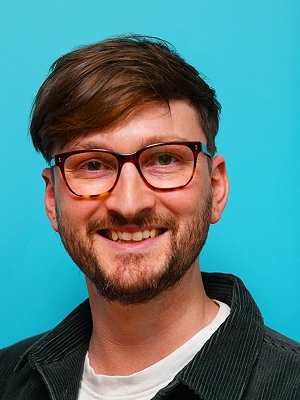
Aidan MacDonald - Teenage Cancer Trust Advanced Clinical Nurse Specialist
- Tel: 0141 301 7586 or 07534 919 338
- Page: 15007 via switchboard on 0141 301 7000
- Email: aidan.macdonald@nhs.scot
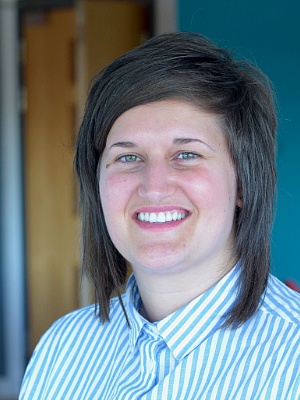
Kirsty Laing - Clinical Nurse Specialist for Teenagers and Young Adults with Cancer
- Tel: 0141 301 7616 or 07790 396 789
- Page: 15347 via switchboard on 0141 301 7000
- Email: kirsty.laing@ggc.scot.nhs.uk
The youth support co-ordinator (YSC) provides non-clinical support. They are responsible for arranging activities and events on and off the ward. This provides opportunities for peer support so that young people can socialise with others who have had cancer and share experiences.
The YSC is also on hand to provide emotional support by being a listening ear to in-patients and out-patients, as and when they need it. This can be on a one to one basis or in a group setting.
Contact
Samantha O'Kane
Tel: 0141 301 7139 or 07940170605
Email: ggc.youthsupportcoordinator@nhs.scot
The youth support co-ordinator is available Monday to Wednesday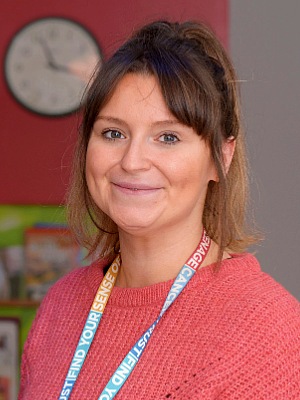
Contact
Hannah Jackson
Tel: 0141 301 7139 or 07940170605
Email: ggc.youthsupportcoordinator@nhs.scot
The youth support co-ordinator is available Thursday & Friday
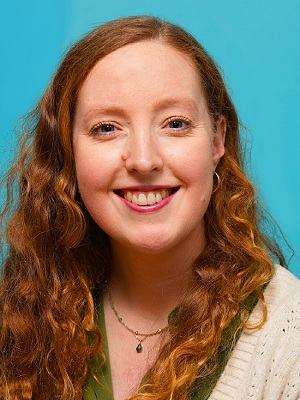
Clinical psychologists are trained to help people understand and deal with difficult emotions, thoughts and behaviours. They talk with people about issues that are important to them to help them find a way to move forward. They can help with a wide range of problems that affect quality of life or make it difficult to have medical treatment or procedures. Some of the common reasons for referral include:
- Difficulties coping with diagnosis and treatment of cancer, and anxiety about the future.
- Depression, low mood.
- Anxiety or stress, panic, phobias, including needle phobia, claustrophobia, social phobia.
- Difficulties in coping with physical symptoms such as chronic pain or fatigue.
- Difficulties coping with changes as a result of cancer or treatment, for example changes in relationships, your appearance, speech, mobility, sexual functioning.
- Cognitive assessment for issues with memory, concentration and attention.
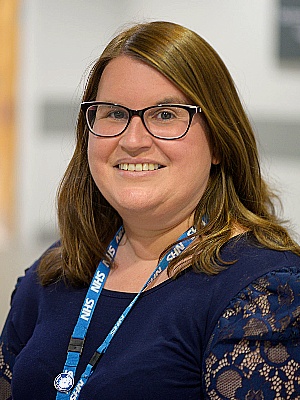
Physiotherapists are experts in finding the best and safest ways for cancer patients to be active. This may involve individual exercise programmes, referring on to activities or classes in the community or advice on everyday activities. With some cancers, research has shown that exercise can reduce the risk of it coming back and increase your chances of surviving. Keeping active can also help you to stay at or return to school/work/college. Specialist physiotherapists can also help with treatment side effects such as tiredness and pain.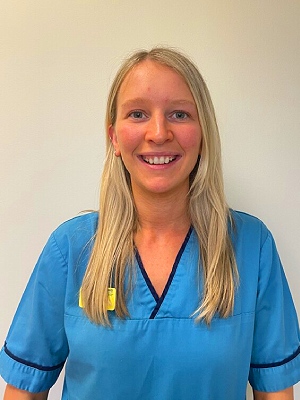
Nutrition is an important part of your care and eating well can support both your treatment and recovery. However, nutritional needs specific to your cancer and treatment may differ from your usual intake or what is considered normal ‘healthy eating’.
The Dietitian is a qualified Health Professional who will give practical and personal advice to help support your nutritional wellbeing during treatment and recovery.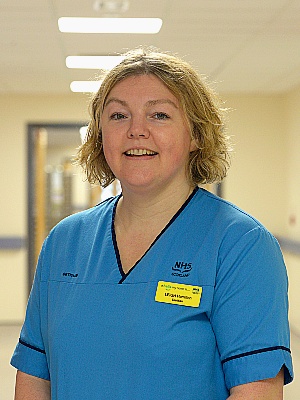
We also work closely with other members of the wider team. Who you’ll meet will depend on your individual needs.
- Oncology/haematology consultants
- Specialist Nurses depending on your type of cancer
- Ward Nurses
- Occupational Therapist
- Palliative Care Team

You may see some of the Teenage and Young Adult cancer team wearing NHS rainbow pride badges. The badges are just one way to show that we provide an open, non-judgemental and inclusive environment for young people that identify as LGBT+.
LGBT+ stands for lesbian, gay bisexual, transgender and the + simply means that we are inclusive of all identities, regardless of how people define themselves.
The badge is a reminder that you can talk to us about who you are and be open about your identity and how you feel. You can also come to us with any concerns or questions. We may not know all of the answers but we will listen to you, treat you with respect and do our best to help you get the right support if you need it.
Resources
https://www.teenagecancertrust.org/information/supporting-lgbtq-young-people-cancer
https://livethroughthis.co.uk/
https://www.scottishtrans.org/
The unit runs a number of activities
Art Therapy
Sessions are run by a qualified Art Therapist alongside the Youth Support Co-ordinator. The group’s emphasis on art and image-making provides young people with alternative means of expression and communication, which help those who find it difficult to talk about their feelings. Through art therapy, the young people can help bring suppressed emotions to the surface in a safe and manageable way. The participants have the opportunity to reflect on their images during the group discussion.
Music Therapy
Music is a great way for young people to connect with how they are feeling in a safe environment. Additionally, it allows them to be creative and learn new skills.
Pizza Tuesdays
Food is a good way to get young people together around the table. This is a great opportunity for peer relationships to form and to share experiences.
Look Good Feel Better
The YSC arranges for an organisation called ’Look Good Feel Better’ to come into the unit a couple of times a year to deliver make-up workshops. The focus is on raising self-esteem and promoting body confidence.
Photography
Photography sessions enables teenage cancer patients to express and manage emotions relating to their illness/and or post-treatment through photography. In addition, it opens up a wider discussion about photography in general and people’s perceptions of it.
Creative writing
Creative writing workshops allow the young people a form of self-expression. Sometimes writing things down can help people come to terms with all of the emotions that they are experiencing.
Other on-site activities include:
Jewellery Making, Prize Bingo, Decoupage, Pool Tournaments, Cake Decorating, T-shirt Printing, Drama Workshops, Music Video Making, Mocktail Making, Individual Guitar Lessons, Professional Calendar Photo-shoot, Oscars Night, Christmas Party, Karaoke, Arts and Crafts, Movie Afternoons.
External activities and events
Off-site activities organised by the YSC include:
- Theatre trips or panto
- Mini golf
- Afternoon tea or meals out
- Escape rooms
- Bowling.
Events organised by the TYA Team
Family Day
The annual ’Family Fun Day’ allows families can come together at an event, for example, a trip to the zoo. The event allows them to have fun whilst meeting other families that are going through a similar situation.
Memory Day (families)
The yearly ’In Memory of’ event honours the significant impact that bereavement has on families. They bring families together to pay tribute to the lives of some of those whom they have lost. The event consists of family group activities that are supportive and reflective.
Memory Day (young people)
We offer a yearly Memory Day for our young people. The young people form very close relationships with one another and when one of them dies there is often a ripple effect. The event allows them to come together to grieve, remember and reflect in a safe environment supported by staff.
Seasons for Growth Programme
This is a programme that the YSC and CLIC Sargent Social Workers are trained to deliver with the young people. This educational programme gives young people the opportunity to explore the concept of loss, grief and bereavement in a small group. The programme is delivered over 4 weekly sessions using a work-book and accompanying reflective activities. We run this programme once a year (or as/when there is a need).
Teenage Cancer Trust facilitated events
RAH
Every Spring, Teenage Cancer Trust takes over the Royal Albert Hall in London to put on a week of music and comedy gigs to raise money for young people with cancer. At the same time, we offer the Ultimate Backstage experience to young people who’ve finished their cancer treatment, a truly unique opportunity for young people to play a part in the week. This includes activities such as writing and performing an original song at a music workshop, a guided tour of the Royal Albert Hall, soaking up the amazing atmosphere backstage, enjoying a delicious dinner in the artist and crew restaurant, before finally enjoying the show from some amazing seats.
Find out more at www.teenagecancertrust.org/backstage
The Way Forward
Teenage Cancer Trust’s Way forward programme is an inspiring, informative and fun residential programme that supports young people after treatment. It is aimed at 18-29 year olds who've finished treatment to come and receive helpful guidance for their life after cancer. They'll have the opportunity to ask questions, share experiences and meet other young people who've had cancer.
The event is a mix of education, interactive workshops, peer support, open discussions and goal-setting sessions.
Find out more at www.teenagecancertrust.org/wayforward

